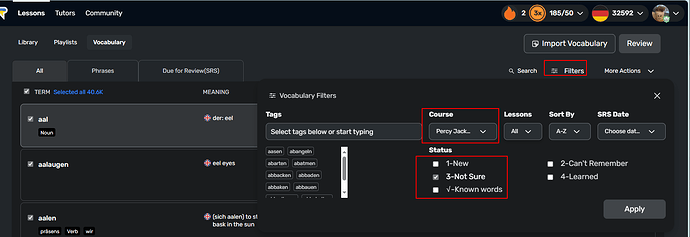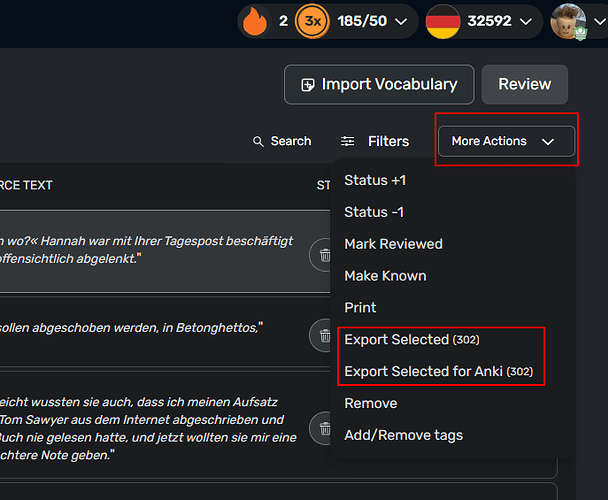When you reach the level where you can understand 90% of content you like, do you think you should still use Anki, or just acquire vocabulary naturally?
You can use it, but I would personally rather advice learning vocab through input and also use this method to aquire new wocab quickly: https://www.youtube.com/watch?v=MpuuStSqbIw
Good luck and keep going. Consistency matters.
Anki seems to be rather a contentious subject. My French might be at the 90% comprehension level, at least with podcasts from French radio stations i.e. ‘proper’ French. I use Anki, the reason being that my active vocabulary is much lower than my passive vocabulary, and I tend to miss or forget important details such as the preposition in phrases e.g. renoncer à faire. Also Anki in French only takes up 15 minutes each day, which is small compared to the two hours spent listening.
However, perhaps the most important question is this. Do you enjoy it? (As a counterpoint, studies have shown that sometimes a study method that is judged by the student to be more enjoyable can be less effective. So enjoyment is not necessarily a measure of effectiveness. However, some consider that language learning should be pleasurable, if only to motivate the student.)
I don’t use it. I started to incorporate it again a little. I think if it’s a fraction of your time spent with the language then it is fine. If it is taking up greater than 10% of your time with the language then I think that is problematic (or not as good a use of your time). Others may disagree =)
I tried Anki but to be honest most of the actual vocabulary I understand and use was not learned via Anki. Also I don’t know why but Anki just got too huge too fast for me to use without massive frustration. Not just “not enjoyable” but quite a lot more unpleasant than that. So I gave up on it and have lived happily ever after. People more clever than I am have figured out how to use it to their advantage and swear by it … and enjoy it. I sincerely cheer them on and wish them all the best in their endeavors.
If you search ANKI in this forum, you will see we have already done some long discussion about it.
However, since then, I could say that ANKI could be useful only in 3 circumstances:
- speed up the initial learning of a new language with the first 500/1000 words or what you like,
- reinforce specific categories that you need for work or other specific interests,
- reinforce collocations (can be done using tags in LingQ)
The fact is that LingQ covers already a lot of ground, and now AI has become a game changer.
In your example, you should ask yourself what you need about the 10% that is missing. If you don’t need to speed up the process, keep going naturally.
In alternative, you can create your own list of missing words and verbs, and ask ChatGPT to create stories connecting those words. Then import the stories back to LingQ and repeat them more times (with audio as well, eventually).
You would probably speed up that 10% even further, and what’s left is not a big deal anymore.
IMHO.
Agree.
I found SRS helpful for the first 2-3 weeks of Chinese which accelerated my comprehension/recall of the VERY frequently used characters and words. That helped me get the proverbial toehold and start using actual stories more quickly and effectively.
However, vocabulary builds up so quickly in the first few weeks of a new language that daily review on LingQ became absolutely impossible to keep up with.
I also realized that past the first hundred words or so, it’s actually more efficient and fun for me to just keep reading/listening to new content. The words that matter to me right now are still quite common and do keep reappearing. Graded readers are a huge asset.
I imagine I’ll start using SRS again when expanding my vocabulary means words that appear infrequently or are deeper into a narrow topic. Or just for a change of pace.
Personally, I recommend no in your case. I think your level is high enough that it is more work than help.
I am using Anki right now for Greek, with a list of like 1200 words I personally put together across a wide range of subjects to try to speed up my familiarity with the language. But I’m also just beginning and can only confidently understand up to like A2-level, maaaaaybe low B1-level material. I will for sure not keep doing Anki anymore once I can confidently understand B1, lower B2 material. At that time, I think I’ll have enough of a hold that Anki won’t be as helpful.
I’m not saying you’re wrong, obviously you found what works for you. In my case I find Anki useful for learning grammar via example phrases, learning to use verbs in context with the correct preposition, and reinforcing details, because I tend to remember things not quite right. That last part might just be my natural stupidity, or maybe it’s more widespread. It does seem we all have different methods.
Today I heard in the wild quite a few words I had drilled with Anki such as s’octroyer.
Mine are just general observations, of course, some sort of general ideas after reading a lot of stuff about it.
You should be able to do what you wrote above by just naturally exposing yourself to more content. You will get most of it with increasing exposure without forcing it to your brain unless you have a specific need to accelerate some part of it.
If necessary, I would do what you are doing only after a 3/4M mark reading words on LingQ. You will realise that you will get the feeling of most of the content, and reiforce with SRS only what’s missing (if necessary).
I personally don’t use ANKI and SRS anymore. But as you say, we have different methods like it should be, and fortunately we have different tools to use.
The fact is that now we have a lot more tools than when ANKI was created, and sometimes we are stuck with old learning patterns without realising all the new possibilities we have today.
Sometimes I myself forget to use the new tools I know already, just because I’ve been used to do in a different way for years.
Yep I use it. Love it. I started with Anki years before I came across LingQ. What I would do is read a novel or article in Italian, look up words I didn’t known on an app dictionary, save them and then put then on a spread sheet and import them into Anki. Very slow and a lot of mucking about but I learnt 3000 words that way and many of them I can use in conversation. This is a big deal. I also get a kick out of reading a novel in LingQ and coming across words I had learnt prior in Anki.
I am aware that you can export words from LingQ to Anki but I only want to export repeat Lingqs not all of them and I am not sure if and how I can do that.
LingQ has incresed my reading speed since I can just click on a word not underline it, look it up, save and so on. Problem is with Lingq am now exposed to a lot more unkown words very quicly which is good but I would like to nail the repeat unknown words on Anki.
Lingq is excellent Anki is excellent Krashen is excellent. Reading a new language is most excellent.
You can filter down what you want to see in many ways. For example, you might want just the ones from a certain course, and only level “3”. Click “Filters” at the top of the vocab section. Then choose the filtering you want to do. Here I selected the course and only level 3.
Then you can choose under “More Actions” to export Selected" or “export for Anki”.
This will email the file to the email you have on file. It takes a few minutes. If you don’t see them after 10-15 minutes, email LingQ support.
I use Anki daily. It is a great tool!
In fact, I increase the status of a word in LingQ only when I encounter the same word again. Every day, I check which words have obtained status 4, and I export those words to a .csv which I will import into Anki for actual studying. Then I move those status 4 words in LingQ to status 5.
I also use the LingQ review of words, and filter 50 words, sorting them by importancy. Its an extra exercise, but the LingQ review of words has several defects. One defect is certainly that LingQ does not care if I type a simple letter (e.g. e or u) instead of the special letter (e.g. é or ú) in Spanish. For Polish that is a disaster! I have reported to LingQ several times in the past (even stopped my subscription), but they don’t seem to care.

